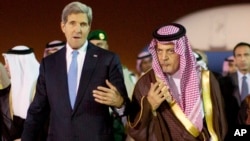U.S. Secretary of State John Kerry praised Saudi Arabia as the "senior player" in the Arab world while on a visit to soothe diplomatic ties frayed by differences over U.S. policy on Syria and Iran.
Kerry told staff Monday at the U.S. embassy in Riyadh before meeting with Saudi King Abdullah that the two nations have important things to discuss to ensure their relationship is "on track."
He also reiterated the U.S. position that Iran will not be allowed to acquire a nuclear weapon.
His one-day visit included talks with Saudi Foreign Minister Prince Saud al-Faisal.
Saudi Arabia, which backs Sunni Muslim-led rebels fighting to oust Syrian President Bashar al-Assad, has voiced concern that proposed Syrian peace talks backed by Washington could leave an Iranian-backed government in power in Damascus. Saudi leaders are also known to be upset over recent U.S. overtures toward Saudi Arabia's strategic rival, Iran.
To underscore those concerns, Saudi Arabia last month rejected a seat on the U.N. Security Council after the United States had expressed its support for the Saudis to sit on the council.
Kerry said Sunday during a brief stop in Egypt that the Obama administration understands the security concerns of Sunni nations about Shi'ite Iran and said Washington is committed to its "major defensive relationships" in the Middle East.
Kerry also had a six-hour visit to Cairo, during which he reassured Egypt's army-backed government that Washington remains a committed "friend and partner," despite suspending some military aid to Egypt.
The Obama administration last month suspended delivery of Apache helicopters and F-16 fighter jets after criticizing the Egyptian military for removing the country's first democratically-elected president, Mohamed Morsi, and replacing him with an interim government.
The aid suspension prompted Foreign Minister Nabil Fahmy to say U.S.-Egyptian relations were in turmoil. However, on Sunday, while speaking alongside Kerry, Fahmy said he had received "indications" that relations are returning to normal.
Kerry's other stops include Israel and the West Bank for meetings with Israeli Prime Minister Benjamin Netanyahu and Palestinian President Mahmoud Abbas. He also is due to visit Jordan, the United Arab Emirates, Algeria, Morocco and Poland.
Kerry told staff Monday at the U.S. embassy in Riyadh before meeting with Saudi King Abdullah that the two nations have important things to discuss to ensure their relationship is "on track."
He also reiterated the U.S. position that Iran will not be allowed to acquire a nuclear weapon.
His one-day visit included talks with Saudi Foreign Minister Prince Saud al-Faisal.
Saudi Arabia, which backs Sunni Muslim-led rebels fighting to oust Syrian President Bashar al-Assad, has voiced concern that proposed Syrian peace talks backed by Washington could leave an Iranian-backed government in power in Damascus. Saudi leaders are also known to be upset over recent U.S. overtures toward Saudi Arabia's strategic rival, Iran.
To underscore those concerns, Saudi Arabia last month rejected a seat on the U.N. Security Council after the United States had expressed its support for the Saudis to sit on the council.
Kerry said Sunday during a brief stop in Egypt that the Obama administration understands the security concerns of Sunni nations about Shi'ite Iran and said Washington is committed to its "major defensive relationships" in the Middle East.
Kerry also had a six-hour visit to Cairo, during which he reassured Egypt's army-backed government that Washington remains a committed "friend and partner," despite suspending some military aid to Egypt.
The Obama administration last month suspended delivery of Apache helicopters and F-16 fighter jets after criticizing the Egyptian military for removing the country's first democratically-elected president, Mohamed Morsi, and replacing him with an interim government.
The aid suspension prompted Foreign Minister Nabil Fahmy to say U.S.-Egyptian relations were in turmoil. However, on Sunday, while speaking alongside Kerry, Fahmy said he had received "indications" that relations are returning to normal.
Kerry's other stops include Israel and the West Bank for meetings with Israeli Prime Minister Benjamin Netanyahu and Palestinian President Mahmoud Abbas. He also is due to visit Jordan, the United Arab Emirates, Algeria, Morocco and Poland.





